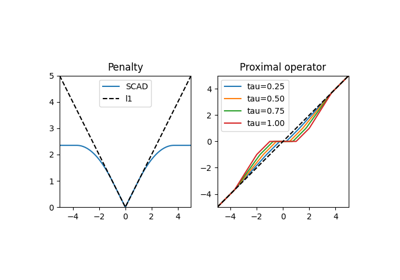pyproximal.ETP#
- class pyproximal.ETP(sigma, gamma=1.0)[source]#
Exponential-type penalty (ETP).
The exponential-type penalty is defined as
\[\mathrm{ETP}_{\sigma,\gamma}(\mathbf{x}) = \sum_i \frac{\sigma}{1-e^{-\gamma}}(1-e^{-\gamma|x_i|})\]for \({\sigma>0}\), and \({\gamma>0}\).
- Parameters
Notes
As \({\gamma\rightarrow 0}\) the exponential-type penalty approaches the \(\ell_1\)-penalty and when \({\gamma\rightarrow\infty}\) tends to the \(\ell_0\)-penalty [1].
As for the proximal operator, consider the one-dimensional case
\[\prox_{\tau \mathrm{ETP}(\cdot)}(x) = \argmin_{z} \mathrm{ETP}(z) + \frac{1}{2\tau}(x - z)^2\]and assume that \(x\geq 0\). The minima can be obtained when \(z=0\) or at a stationary point, where the latter must satisfy
\[x = z + \frac{\gamma \sigma \tau}{1-e^{-\gamma}} e^{-\gamma z} .\]The solution to the above equation can be expressed using the Lambert W function.
- 1
Gao, C. et al. “A Feasible Nonconvex Relaxation Approach to Feature Selection”, In the Proceedings of the Conference on Artificial Intelligence (AAAI), 2011.
Methods
__init__(sigma[, gamma])affine_addition(v)Affine addition
chain(g)Chain
elementwise(x)grad(x)Compute gradient
postcomposition(sigma)Postcomposition
precomposition(a, b)Precomposition
prox(**kwargs)proxdual(**kwargs)

